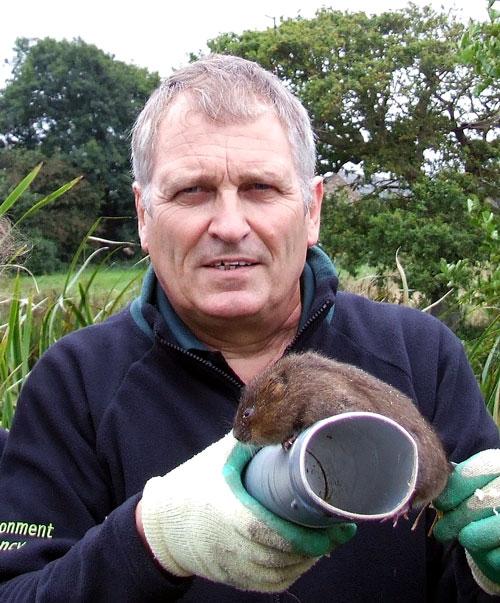Rewilding conference told of need to stop decline in biodiversity
23 Nov 2018
The UK ‘is going backwards in biodiversity’ and rewilding significant parts of our environment is ultimately needed, a conference heard.
Prof Alastair Driver, of Rewilding Britain, told the event organised by the Royal Agricultural University (RAU) and Cirencester College: “The simple fact is that we are going backwards in biodiversity. We need something significantly different in addition to traditional nature reserve conservation. That is the underpinning case for rewilding.”
Prof Driver was among a number of nationally renowned experts in the field speaking at the Rewilding: Perspectives and Applications conference, held at the RAU’s Boutflour Hall.

He added: “But we have a very long journey to take – we are rewild-ing for the time being, and it will be a very long time before we have rewilded. In England and Wales, we cannot jump to purist rewilding where immediately we are truly hands-off across large areas and not intervening at all. It is not practical and not likely in such a crowded country.”
Prof Driver continued: “The Garden of England is England. We are a giant garden. Every square metre has been managed by man over the centuries.” He presented a simple definition of Rewilding as ‘the large-scale restoration of ecosystems to the point where nature is allowed to take care of itself’.
On behalf of Rewilding Britain, he is currently assessing large areas of uplands such as the Lake District, Peak District and Kielder Forest as areas where biodiversity might be improved by rewilding projects.
Christopher Price, Director of Policy and Advice at the Country Land and Business Association (CLA) suggested landowners considering rewilding could go some way along that journey without compromising their tax status.
He added that many farmers were already delivering strong levels of environmental diversity using other methods than rewilding: "Landowners won't want to divest themselves of management altogether. Many are achieving high standards of environment through methods that are the antithesis of rewilding."
Other speakers included Sir Charles ‘Charlie’ Burrell, whose Knepp Castle Estate, in Horsham has become a flagship experiment for farmland restoration. He explained: “We decided to come out of arable farming over a six year period. The break-up of any constant look or feel was good for nature. Life has poured back in.”
That strategic decision has meant a resurgence in birds - turtle doves and nightingales – as well as the purple emperor butterfly and the violet dor beetle, added Dr Tony Whitbread of the Sussex Wildlife Trust.
Dr David Hetherington, discussed the challenges and opportunities of a potential re-introduction of lynx to the UK. Dr Hetherington, of the Cairngorms National Park Authority and author of ‘The lynx and us’ said that a “respectful dialogue” between farmers and those supporting the lynx, pointed the way forward. Scotland was the most likely area to re-establish the creatures, he felt.
Ecologist Derek Gow whose consultancy specialises in water vole conservation said: "Rewilding for many species is not about sitting on our hands and just waiting for natural processes occur. The end game for many of these species is just around the corner. Nature is capable of amazing things – if we help it." On beavers, he added: “This animal breathes life back into landscapes that are lost – biomass rises exponentially and biodiversity of the landscape also rises considerably in response to their presence. Why are we waiting to restore this species? If beavers are managed effectively this is a desirable thing to do. There’s no reason to hold back.”
His arguments were supported by evidence from by Sara King of Ecosulis on the impact of rewilding: “We know beavers are ecosystem engineers & change habitat structure quite a lot. So, how do they affect the processes within that system?” Beaver reintroduction is linked to greater and rarer bat numbers, she said.
Mark Elliott of Devon Wildlife Trust discussed the beaver reintroduction trial currently running in the River Otter, in East Devon. He said: "Landowners need to be given the financial support to provide space for beaver-generated wetlands."
Dr Andrew Stringer of Gloucestershire Wildlife Trust is working with the Vincent Wildlife Trust, the Forestry Commission and the Woodland Trust to assess the feasibility of re-introducing Pine Martens in Forest of Dean and the Wye Valley.
The idea has found ‘overwhelming support’ in public surveys he told the audience - with only three per cent thinking it was a bad idea. The Vincent Wildlife Trust has already translocated over 51 of the animals from Scotland to Wales.
Nick Barter of Defra made the point that 'encouraging and rewarding natural processes' is a key element of the government’s 25 Year Environmental Plan - as is connecting people to the environment for health benefits.
Sacha Dench, of the Wildfowl and Wetlands trusts closed the conference by chairing a panel discussion of the speakers who were also joined by Thomas Binns, Chairman of the NFU uplands forum. He agreed there was scope and place for rewilding alongside continuous dialogue.
The RAU and Cirencester College have been jointly delivering environment courses since 2008. The Conference was created to provide a new platform for sharing knowledge in this sector. The organising team consisted of Stephanie Masefield and Dr Jane Fern (Cirencester College) and Dr Ian Grange and Dr Kelly Swallow (RAU).